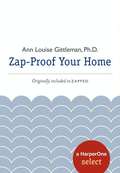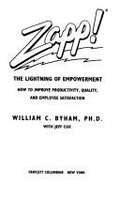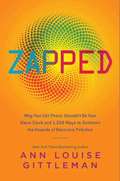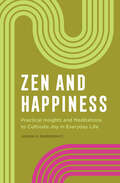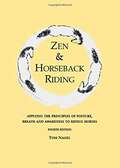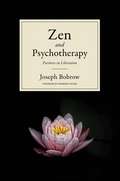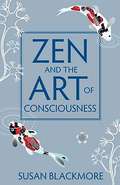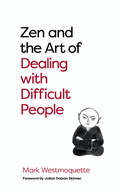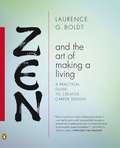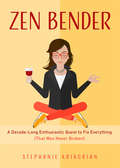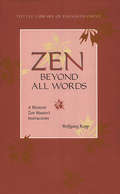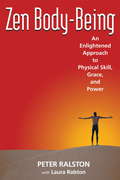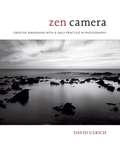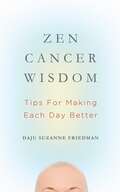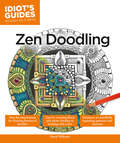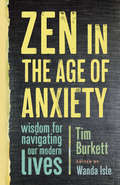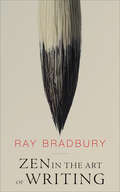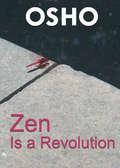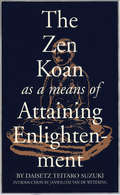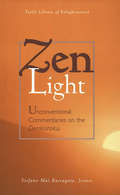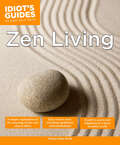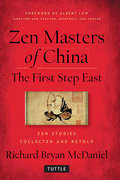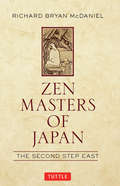- Table View
- List View
Zaner-Bloser Handwriting: A Way to Self-Expression (Grade #2)
by Clinton S. Hackney Virginia H. LucasThis textbook helps students with their handwriting.
Zap Proof Your Home
by Ann Louise GittlemanThis selection from award-winning health pioneer Ann Louise Gittleman's Zapped tells you how to protect yourself from the hazards of electromagnetic pollution in the one place you should feel safe-your own home. We are all affected by the electromagnetic forces in our world-whether from our cell phones or from the electrical outlets in our walls. Author Ann Louise Gittleman proposes that we're being zapped by high levels of electromagnetic fields, and the wavelengths and frequencies they produce have reached the point of toxicity-making us feel tired, irritable, and weak. In this eSelect, you learn about the strength and location of harmful electromagnetic fields in your home. With step-by-step instruction, the author walks you room-by-room, teaching you how to remake the force fields in your environment and create positive energy flow.
Zapp! The Lightning of Empowerment: How To Improve Quality, Productivity, and Employee Satisfaction
by Jeff Cox William C. ByhamEnergize your employees, build up your business, and put your organization on a high-performance track.
Zapped: Why Your Cell Phone Shouldn't Be Your Alarm Clock and 1,268 Ways to Outsmart the Hazards of Electronic Pollution
by Ann Louise GittlemanHow many electronic innovations have you dialed, watched, surfed, charged, listed to, booted up, commuted on, cooked with, and plugged in today? Consider your typical day: If you're like most people, it probably starts in front of your coffee maker and toaster, ends as you set the alarm on your cell phone, and involves no end of computers and gadgets, televisions and microwaves in between. We're being zapped: Today 84 percent of Americans own a cell phone, 89 million of us watch TV beamed in by satellite, and we can't sip a cup of coffee at our local cafÉ without being exposed to Wi-Fi. The very electronic innovations that have changed our lives are also exposing us, in ways big and small, to an unprecedented number of electromagnetic fields. Invisible pollution surrounds us twenty-four hours a day, seven days a week, interrupting our bodies' natural flow of energy. And for some, that pollution has reached the point of toxicity, causing fatigue, irritability, weakness, and even illness. But we don't have to simply surrender. Ann Louise Gittleman brings forth the latest research into electromagnetic fields to create this groundbreaking guide for every citizen of the wireless age. With the proactive, levelheaded approach that has made her one of our most respected health experts, she not only clarifies the risks but also offers specific, step-by-step information for how anyone can minimize them. From where you place your sofa to when you use your cell phone to what you eat for dinner, Zapped is packed with strategies for avoiding and mitigating the damaging effects of electropollution. As she examines modern life room by room, device by device, Gittleman reveals a master plan for detoxifying your surroundings and protecting yourself and your family. We don't need to abandon our homes-or even give up our PDAs-to be healthier and happier. Based on the latest scientific data, case studies, and Gittleman's years of clinical practice, Zapped is an empowering guide to living safely with the gadgets we can't live without.
Zen and Happiness: Practical Insights and Meditations to Cultivate Joy in Everyday Life
by Joshua R. PaszkiewiczHone your Zen practice and harness joy Life is filled with thrilling highs, crushing lows, and everything in between. But often, we spend too much time planning for and reacting to our experiences, rather than simply "being" in them. This thoughtful guide shows you how to integrate Zen traditions into your daily life so you can focus on letting go, being present, and finding bliss in the moment. What makes this a standout among Zen books: Get an insight into Zen—Learn about the foundations of Zen as you delve into its Buddhist roots, investigate a beginner's mind, and gain greater awareness of how the practice spurs self-reflection. Redefine happiness—Through the lens of Zen Buddhism, see how mindfulness observations can help you achieve greater contentment. Develop a practice—Discover a range of exercises to help you put the principles of Zen into practice, from mindful eating to walking meditations. Cultivate happiness through regular Zen practice with help from this insightful guide.
Zen And Horseback Riding: Applying The Principles Of Posture, Breath And Awareness To Riding Horses
by Tom Nagel Sally SwiftZen & Horseback Riding explains the location, importance and use of the psoas muscles. The psoas are the deep core muscles that link the upper and lower girdles of the body. They are the basis of all efficient body movement and can be used by everyone in any athletic activity. This book explains how to use your body to achieve tone, find self-carriage and to move correctly both on and off the horse. Zen & Horseback Riding is about using horseback riding as a means of self-development and training. It is about improving both your riding and your life. "synopsis" may belong to another edition of this title.
Zen and Psychotherapy: Partners in Liberation
by Joseph BobrowA new take on the interplay of emotional and spiritual development.&“Please read this book. Joseph Bobrow is a true meditation teacher who walks his talk and enjoys his practice.&”—Thich Nhat Hanh This book is an intimate dialogue that examines the interplay of emotional and spiritual development through the lens of Zen Buddhism and psychotherapy. Zen and Psychotherapy artfully illuminates the intrinsic connections between the two practices, and demonstrates how the traditions can be complementary in helping to live a truly fulfilled and contented life. Zen teacher and psychologist Joseph Bobrow deftly shows how the major themes of trauma, attachment, emotional communication, and emotional regulation play out in the context of Zen and of psychotherapeutic practice, and how, in concert, both provide a comprehensive, interactive model of fully functioning human life.
Zen and the Art of Consciousness
by Susan BlackmoreWho are you? When are you? What were you conscious of a moment ago? This groundbreaking book sees acclaimed psychologist Susan Blackmore combining the latest scientific theories about mind, self, and consciousness with a lifetime's practice of Zen. Framed by ten critical questions derived from Zen teachings and designed to expand your understanding and experience of consciousness, Ten Zen Questions doesn't offer final - or easy - answers, but instead provides an inspiring exploration of how intellectual enquiry and meditation can tackle some of today's greatest scientific mysteries. Dr Susan Blackmore is a writer and broadcaster. She lives in Bristol, UK.
Zen and the Art of Dealing with Difficult People
by Mark WestmoquetteThis is a unique guide to coping with challenging people using practical Zen and mindfulness tools. It helps readers explore their reactions, break free from knee-jerk response patterns and see if these people may in fact prove to be useful teachers in life – troublesome Buddhas.This is a guide to applying the teachings of mindfulness and Zen to the troublesome or challenging people in our lives. Perhaps you can see there&’s often a pattern to your behaviour in relation to them and that it often causes pain – perhaps a great deal of pain. The only way we can grow is by facing this pain, acknowledging how we feel and how we&’ve reacted, and making an intention or commitment to end this repeating pattern of suffering. In this book, Mark Westmoquette speaks from a place of profound personal experience. A Zen monk, he has endured two life-changing traumas caused by other people: his sexual abuse by his own father; and his stepfather&’s death and mother&’s very serious injury in a car crash due to the careless driving of an off-duty policeman. He stresses that by bringing awareness and kindness to these relationships, our initial stance of &“I can&’t stand this person, they need to change&” will naturally shift into something much broader and more inclusive. The book makes playful use of Zen koans – apparently nonsensical phrases or stories – to help jar us out of habitual ways of perceiving the world and nudge us toward a new perspective of wisdom and compassion.
Zen and the Art of Making a Living: A Practical Guide to Creative Career Design
by Laurence G. BoldtWith today's economic uncertainties, millions of Americans realize they must seize control over their own career paths. They want work that not only pays the bills but also allows them to pursue their real passions. In this revised edition, Laurence Boldt updates and revises his revolutionary guide to meet the challenges of the twenty-first century workplace. The first part of this book helps readers to identify the work that they really want to do, while the second provides practical, active steps to finding or creating that work. Zen and the Art of Making a Living goes beyond inspiration, providing a proven formula for bringing creativity, dignity, and meaning to every aspect of the work experience.
Zen Bender: A Decade-Long Enthusiastic Quest to Fix Everything (That Was Never Broken)
by Stephanie Krikorian&“The book is filled with humor and soul-baring honesty, as Krikorian describes her adventures down just about every self-help road there is.&” —The Independent When the recession turned her life upside down, Stephanie Krikorian had to reinvent her life—and fast. She started ghostwriting self-help books for women. Between writing and researching she realized that everywhere she looked there was AFOG. Another freaking opportunity for growth. Soon she wasn&’t just writing each book; she was living them. This was the start of a ten-year zen bender of dieting, dating, journaling, meditating, and Marie-Kondo-ing on a quest for that ultimate self-help high. Stephanie Krikorian spent her forties trying all of the dating hacks to find love and respect, all of the diets to build self-esteem in a new body, and all of the spiritual guidance to become centered through self-care. On the brink of turning fifty she realized that being better wasn&’t what she craved; it was something else altogether. Zen Bender is the story of one woman&’s journey to radical acceptance, with some questionable advice along the way. A witty, moving, insightful story, the woman behind bestselling celebrity self-help books shares her story of being hooked on the self-help fix for a decade before learning that all the self-help in the world won&’t help you trust gut. &“A wise, witty and thought-provoking book that tends in just the place you&’d hope it would. A great read whether you have a Reiki healer on speed dial, or, well, not.&” —Marianne Power, author of Help Me!: One Woman&’s Quest to Find Out if Self-Help Really Can Change Her Life
Zen Beyond All Words
by Wolfgang Kopp Barbara Wittenberg-HaenauerZen Beyond All Words contains a selection of talks given by MasterWolfgang Kopp at the Tao Ch'an Center in Wiesbaden, Germany, during the summer of 1992. In the spirit of the ancient Chinese Ch'an masters, Wolfgang Kopp teaches a direct and powerful Zen. He conveys neither a theoretical system nor a one-sided dogmatism of sitting, and he neither wears customary robes nor holds a traditional title.
Zen Body-Being: An Enlightened Approach to Physical Skill, Grace, and Power (Zen Buddhism Ser.)
by Peter Ralston Laura RalstonIn this inspiring guide, Peter Ralston presents a program of "physical education" for anyone interested in body improvement. Using simple, clear language to demystify the Zen mindset, he draws on more than three decades of experience teaching students and apprentices worldwide who have applied his body-being approach. More of a transformative guide than a specific list of exercises devoted to any particular physical approach, Zen Body-Being explains how to create a state of mental control, enhanced feeling-awareness, correct structural alignment, increased spatial acuity, and even a greater interactive presence. Exercises are simple, often involving feeling-imagery and meditative awareness, which have a profound and sometimes instant effect. Where similar guides teach readers what to do, this book teaches readers how to be.From the Trade Paperback edition.
Zen Camera: Creative Awakening with a Daily Practice in Photography
by David UlrichZen Camera is an unprecedented photography practice that guides you to the creativity at your fingertips, calling for nothing more than your vision and any camera, even the one embedded in your phone. David Ulrich draws on the principles of Zen practice as well as forty years of teaching photography to offer six profound lessons for developing your self-expression. Doing for photography what The Artist’s Way and Drawing on the Right Side of the Brain did for their respective crafts, Zen Camera encourages you to build a visual journaling practice called your Daily Record in which photography can become a path of self-discovery. Beautifully illustrated with 83 photographs, its insights into the nature of seeing, art, and personal growth allow you to create photographs that are beautiful, meaningful, and uniquely your own.You’ll ultimately learn to change the way you interact with technology—transforming it into a way to uncover your innate power of attention and mindfulness, to see creatively, and to live authentically.
Zen Cancer Wisdom: Tips for Making Each Day Better
by Suzaanne FriedmanWith a much-needed sense of levity, Daju Suzanne Friedman teaches the art of keeping one's body, mind, and spirit together while living with cancer."Layman Wang once asked his attendant,'What would you do if a dragon suddenly arrived here?' His attendant answered, 'I wouldn't pay attention to anything else.' This is how it feels when you've been diagnosed with cancer. Your attention and focus shift dramatically towards just this one thing. While single-minded focus can be beneficial, it is also important to remember that you are more than your diagnosis, and that there is more to life than being a patient." --from the introduction In Zen Cancer Wisdom, Daju Suzanne Friedman--Zen teacher, Chinese medicine doctor, and Qigong specialist--shares the inspirations, insights, and humor that helped her to continue to live fully in the face of cancer. With sections devoted to soothing the spirit, harnessing the mind, nourishing the body, and qigong stretches for soothing aches and pains, Friedman provides thoughtful guidance on topics ranging from hair loss and constipation to coping with stress and learning to laugh again. Each chapter begins with an anecdote drawn from the Zen tradition, followed by personal reflection, and a brief guided practice specifically for cancer patients. Pocket-sized, with short, buoyant chapters, and meditation exercises designed to be practicable anywhere in only a few minutes time, Zen Cancer Wisdom is the perfect companion book for cancer patients.
Zen Doodling (Idiot's Guides)
by David WilliamsDoodling isn't necessarily a mindless pursuit. There's hidden discipline, order, and joy behind artful scribbles. Idiot's Guides: Zen Doodling gives readers beautiful, full-color instruction and all they need to start using ordered, repeated "tangle" designs that are great creative expressions and works of art unto themselves. The book includes step-by-step instructions for drawing more than 20 doodle forms and patterns.
Zen in the Age of Anxiety: Wisdom for Navigating Our Modern Lives
by Tim Burkett Wanda IsleZen wisdom for identifying the causes of mental and emotional anxiety epidemic in today's world and for finding the path to a peaceful heart in the midst of them--a path that leads directly though the center of the anxiety we're trying to escape.Wrestling with fear doesn’t have to be a negative experience. This book offers an approach to life that unlocks a new way of thinking and being in the world, one that leads directly through the center of the anxieties we seek to avoid.Written in the style of an owner’s manual, a guide to being human, Burkett focuses on areas of pain and anxiety as they tend to manifest for modern people: feelings of unworthiness, and issues surrounding sex, money, failure, and even death. Providing wisdom from Zen (channeled through his many experiences as a psychotherapist) and using language and metaphors from popular culture, he takes anxiety and teaches us to turn those fears into the building blocks of a fulfilling life.
Zen in the Art of Writing: Essays On Creativity
by Ray BradburyThe celebrated author of Fahrenheit 451 and The Martian Chronicles offers inspiration and insight on finding one&’s muse and channeling it onto the page. Acclaimed writer of novels and short stories as well as screen- and stage plays, Ray Bradbury has established himself as one of the most legendary voices in science fiction and fantasy. In Zen in the Art of Writing, he shares how his unbridled passion for creating worlds made him a master of the craft. Part memoir, part philosophical guide, the essays in this book teach the joy of writing. Rather than focusing on the mechanics of putting words together, Bradbury&’s zen is found in the celebration of storytelling that drove him to write every day. Bringing together eleven essays and a series of poems written with his own unique style and fervor, Zen in the Art of Writing is a must read for all prospective writers and Bradbury fans. &“Bradbury lovers will find this a Bradbury feast.&” —Kirkus Reviews
Zen Is a Revolution
by Osho Osho International FoundationIn this talk Osho takes his audience into the world of ZEN. "There are a few essential things which make Zen absolutely different from any kind of teaching. The most important of these essentials is that Zen is a revolution. All other religions are servants to the vested interests. The rich people and the powerful people, the politicians, have dominated all the religions. The priests have been nothing but servants to these criminals. It is such a worldwide conspiracy that no one recognizes it. It is so obvious and so simple that we are from the very beginning, from our very childhood, being programmed." From an original series: Rinzai: Master of the Irrational, by Osho.
Zen Koan as a Means of Attaining Enlightenment
by Daisetz Teitaro SuzukiZen Koan as a Means of Attaining Enlightenment Presents the history and application of the koan exercise--the means for realizing enlightenment--with depth and clarity.<P><P>The koan system has effected a special development in Zen Buddhism, and is a unique contribution to the history of religious consciousness. When the importance of the koan is understood, it may be said that more than half of Zen is understood.
Zen Light
by Stefano Mui BarragatoThe Denkoroku, or "Record of Transmitting the Light," contains the enlightenment stories of the earliest Zen ancestors. In Zen Ught, the author comments on this Buddhist classic, which he studied as part of his own advanced Zen training. Sensei Barragato brings the varied experiences of his life and his studies in Catholicism and Quaker practice to the teachings of Zen Buddhism, making these commentaries at once off-beat, refreshing, and revealing. He touches on the major issues that affect our lives, making thisbook of interest to both the beginning as well as the advanced student of Zen.
Zen Living: A Simple Explanation of the Meaning of Zen and What It Offers (Idiot's Guides)
by Domyo Sater BurkIn today's fast-paced, technology-laden society, it's easy to become overwhelmed. People seek calm and simplicity, but have a hard time realizing a "Zen" life. Monk and sensei Domyo Sater Burk illustrates how to get started on the path to peace and enlightenment, regardless of cultural or religious affiliation. You'll learn the foundation and essential teachings of Zen practice, how to engage in meditation and mindfulness, and how to live daily within a Zen moral code.
Zen Masters of China
by Albert Low Richard Bryan Mcdaniel[Zen Masters of China presents more than 300 traditional Zen stories and koans, far more than any other collection. Retelling them in their proper place in Zen's historical journey, it also tells a larger story: how, in taking the first step east from India to China, Buddhism began to be Zen.]The stories of Zen are unlike any other writing, religious or otherwise. Used for centuries by Zen teachers as aids to bring about or deepen the experience of awakening, they have a freshness that goes beyond religious practice and a mystery and authenticity that appeal to a wide range of readers.[Placed in chronological order, these stories tell the story of Zen itself, how it traveled from West to East but also how it was transformed in that journey, from an Indian practice to something different in China (Ch'an) and then more different still in Japan (Zen). The fact that its transmission was so human, from teacher to student in a long chain from West to East, meant that the cultures it passed through inevitably changed it.Zen Masters of China is first and foremost a collection of mind-bending Zen stories and their wisdom. More than that, without academic pretensions or baggage, it recounts the genealogy of Zen Buddhism in China and, through the stories themselves, illuminates how Zen became what it is today.]
Zen Masters of China: The First Step East
by Richard Bryan Mcdaniel Albert Low[Zen Masters of China presents more than 300 traditional Zen stories and koans, far more than any other collection. Retelling them in their proper place in Zen's historical journey, it also tells a larger story: how, in taking the first step east from India to China, Buddhism began to be Zen.]The stories of Zen are unlike any other writing, religious or otherwise. Used for centuries by Zen teachers as aids to bring about or deepen the experience of awakening, they have a freshness that goes beyond religious practice and a mystery and authenticity that appeal to a wide range of readers.[Placed in chronological order, these stories tell the story of Zen itself, how it traveled from West to East but also how it was transformed in that journey, from an Indian practice to something different in China (Ch'an) and then more different still in Japan (Zen). The fact that its transmission was so human, from teacher to student in a long chain from West to East, meant that the cultures it passed through inevitably changed it.Zen Masters of China is first and foremost a collection of mind-bending Zen stories and their wisdom. More than that, without academic pretensions or baggage, it recounts the genealogy of Zen Buddhism in China and, through the stories themselves, illuminates how Zen became what it is today.]
Zen Masters of Japan
by Richard Bryan McdanielZen Masters of Japan is the second book in a series that traces Zen's profoundly historic journey as it spread eastward from China and Japan, toward the United States. Following Zen Masters of China, this book concentrates on Zen's significant passage through Japan. More specifically, it describes the lineage of the great teachers, the Pioneers who set out to enlighten an island ready for an inner transformation based on compassionate awareness.While the existing Buddhist establishment in Japan met early Zen pioneers like Dogen and Eisai with fervent resistance, Zen Buddhism ultimately perservered and continued to become further transformed in its passage through Japan. The Japanese culture and Japanese Buddhism practices further deepened and strengthened Zen training by combining it with a variety of esoteric contemplative arts-the arts of poetry, the tea ceremony, calligraphy, and archery. Zen Masters of Japan chronicles this journey, and shows how the new practices soon gained in popularity among all walks of life-from the lowly peasant, offering a hope of reincarnation and a better life; to the Samurai warrior due to its casual approach to death; to the ruling classes, challenging the intelligentsia because of its scholarly roots. A collection of Zen stories, meditation, and their wisdom, Zen Masters of Japan also explores the illusive state of 'No Mind' achieved in Japan that is so fundamental to Zen practices today.

